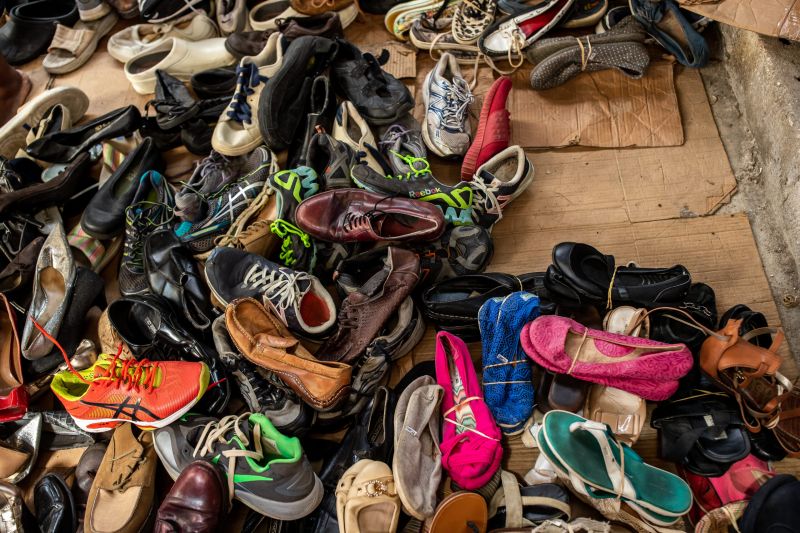
Give greenwashing the boot: Shoe and clothing donations can deliver real corporate sustainability
Four in ten UK businesses are still breaking new greenwashing laws. Is your fashion brand at risk?
2024 was a big year in the battle against greenwashing. The EU banned companies from making vague environmental promises, such as ‘carbon neutral’, ‘net zero’ and ‘environmentally friendly’. Meanwhile, the UK issued new guidance to make sure fashion brands’ claims are accurate and substantiated—with those who fail to comply risking hefty fines.
The best way to protect your business from penalties and make a real, sustainable difference is by taking measurable action. Let’s explore how your brand can go beyond greenwashing and make meaningful contributions through donations—promoting a truly circular fashion industry.
Why greenwashing laws are getting tougher
Clothing and footwear manufacturing has a significant impact on the environment. Long supply chains and resource-intensive production mean that the fashion sector is the second biggest consumer of water worldwide. It’s also responsible for around 10% of global greenhouse gas emissions—more than the aviation and shipping industries combined.
Unfortunately, clothing and footwear’s environmental impact extends beyond its wearable lifespan, too. According to Greenpeace, less than 1% of all clothes are made from old textiles and just 3% of clothes are made from recycled materials. Instead, the equivalent of a truckload of clothing waste is incinerated or landfilled worldwide every second.
As a result, customers are growing increasingly eco-conscious in their beliefs and buying habits. 73% of EU consumers say environmental impact is ‘very important’ or ‘rather important’ when making a purchasing decision, with 60% reporting that they have bought products specifically because of their lower environmental impact. In the UK, over a fifth (21%) of shoppers are willing to pay extra for products that favour sustainability.
It’s no surprise, then, that brands want to appeal to customers by promoting green claims about their products. But greenwashing occurs when a company misleads consumers into believing it’s doing more to protect the environment than it really is. And with vague or unverifiable claims like ‘sustainable’ or ‘ethically made’ now off the table, what’s a demonstrable way that your brand can make a difference?
Turning surplus stock into educational and economic opportunity
At Soles4Souls, we help care for the planet and for people by extending the life of shoes and clothing that might’ve otherwise been discarded. First, we partner with fashion brands to accept donations of new or gently used apparel. Then, we sell and distribute their shoes and clothing to help people build small businesses in low-income countries worldwide.
We also help get new shoes and clothing to people in crisis situations, freeing up financial resources they can use toward other needs. And in the US, we provide new athletic shoes to children who are experiencing homelessness, eliminating a barrier to educational and extracurricular opportunities.
Importantly, this clothing and shoe circularity helps products to stay in use. It diverts them from landfills, reduces waste disposal costs and minimises the need for more carbon-intensive manufacturing. And when it comes to greenwashing, circularity provides brands with substantiated evidence of sustainable leadership.
Shoe and clothing donations can make a measurable impact
Your partnership with Soles4Souls can be cited as a key facet of your ESG reporting. We reuse 99% of the shoes and clothing donations we receive. Donating a pair of shoes to us, for instance, reduces its CO2 impact per wear by extending its life at least 15 months. For donations beyond use or repair, we partner with companies that turn waste into energy and other useful products.
We also monitor our environmental footprint by measuring our carbon emissions through a third-party, Climate Smart, to make data-driven decisions and pursue new, green initiatives related to infrastructure, sourcing and energy. And we reduce our broader community’s environmental footprint by optimising our supply chain, minimising the distance between donors, Soles4Souls and those we serve.
By partnering with Soles4Souls, you can deliver real, quantifiable environmental progress—and tell regulators and customers all about it, too.
“Soles4Souls simplifies social impact by making it commercially viable for an organisation. We also help brands navigate the trickier side of social impact reporting by advising them on product donation and end-of-life recycling or energy generation redistribution.”
- Nancy Youssef, Chief Business Development Officer & Executive Vice President, International at Soles4Souls
Ready to protect your brand from greenwashing?
Join the brands leading the charge against greenwashing and make a real difference to circularity today. A Soles4Souls partnership helps your brand stay compliant, reduce costs and prove your sustainability to customers. To learn more, please contact masjav@soles4souls.org.